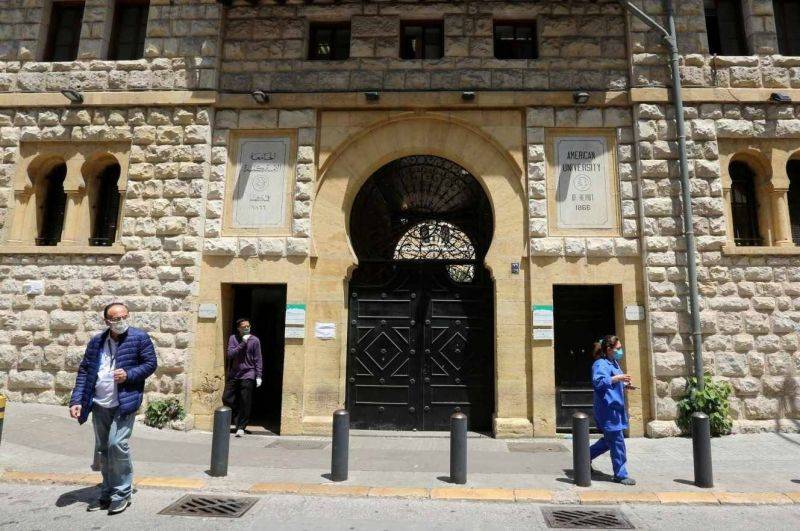
People wearing masks walk near the main gate entrance of the American University of Beirut (AUB) Lebanon, May 7, 2020. (Credit: Aziz Taher/Reuters file photo)
BEIRUT— Since Banque du Liban increased the so-called “Lebanese dollar” or “lollar” exchange rate used for bank withdrawals from LL3,900 to LL8,000 to the dollar in December, some universities have begun to increase their tuition rates.
On Jan. 31, some 16 days after the late courses registration period, the Lebanese American University sent an email to all students announcing a change in tuition payment rates.
While students previously had the option to pay their full tuition in cash Lebanese lira at the LL3,900 rate, the email introduced a percentage to be paid at the LL8,000 exchange rate.
“Your statement of fees for spring 2022 will be available starting Wednesday, February 2, 2022. Please find below the mode of payment that will be in place: 35% to be paid in cash LBP, 35% to be paid in USD check: personal checks will be accepted,” the email noted. “…The remaining 30% may be paid either in cash LBP, check LBP or check USD.”
The portion to be paid in USD by check would, in effect, be a lollar payment at the LL8,000 rate.
The email added that “this payment modality is necessary to help the university keep serving you in this ongoing economic crisis, where the local currency has lost its value and everyday costs are dollarized,” adding, “we understand this can be challenging and LAU would not adopt such measures if they were not absolutely necessary.”
Similarly, the students of Saint Joseph University have held protests since the private university’s administration decided to increase the tuition by $250 to be paid in “fresh dollars,” meaning hard currency USD rather than lollars, in the middle of the academic year.
The administration argued that the tuition increase is necessary to retain its faculty and staff, who have been departing en masse, and to pay expenses priced in dollars. A communique from the administration told students facing “real difficulties” in paying to contact the university’s social services.
LAU administration officials did not respond to requests for comment on the new tuition rate.
Teya Abou Zour, vice president of the student council at LAU said that the university’s students were shocked and did not welcome the idea.
She added, however, that the university had partially adjusted its stance at the students’ request. Initially, the administration had asked the 35 percent of the tuition to be paid in lollars to be paid by personal or banker’s check, which would create a hardship for those who do not have local dollar bank accounts.
“The student council then talked to the university administration to [ask them to] consider payments in cash, and the university agreed,” she said.
On Feb. 3, the university sent a follow-up email to all students saying: “Following the students’ request to pay their Local USD portion of the tuition in LBP at the rate of 8,000, this is to inform you that the university has decided to accommodate this request.”
The email added that “students who cannot pay the relevant portion of their tuition in USD through local transfer or check, can pay in LBP at the rate of 8,000 LBP. Said payment will be allowed exceptionally for the Spring 2022 term and should be made in cash at LAU Business Office along with the payment of the other portion of the tuition.”
Abou Zour noted that LAU had also removed the deadline for paying tuition fees and extended the payment date initially, which was set between Feb. 11 and Feb. 18 without penalty, saying “the university was and still is flexible and [administration] promised that they don’t want anyone [student] to leave the university so they can submit their cases for an increase in financial aid.”
Nevertheless, students said the increase will sting.
“My university tuition increased by LL13 million when the university changed the payment modality this semester,” said an LAU student who asked not to be named. “While I’m fortunate enough to [be able to] ask for a loan from my parents, I’m thinking of my colleagues who aren’t.”
The university should show more consideration towards the financial situation of people living in the country, Fatima Makki, a graduate student said.
“They [university administration] are considering that we get a dollar income, which no one is getting nowadays honestly.” she said. “It is a very tough situation to be in when [midway] through the semester they [LAU administration] change the method of payment.”